On the Bookshelf
Faculty books
 |
Fairness and Freedom: A History of Two Open Societies By David Hackett Fischer You might expect the United States and New Zealand to be mirror images of each other. Both were founded by English-speaking colonists who had to find ways of coexisting with native populations. Both were deeply rooted in English law and customs. Both developed democracies and mixed-enterprise economies. And yet the political value each came to hold most dear is different: freedom, for Americans; fairness, for New Zealanders. Pulitzer Prize-winning historian Fischer examines why this came to be, and how open societies make “fundamentally similar choices in profoundly different ways.” His comprehensive, absorbing comparison of the paths chosen by two nations holds real resonance in an increasingly interconnected world. |
Alumni Books
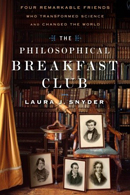 |
The Philosophical Breakfast Club By Laura J. Snyder ’87 The Brat Pack they were not. In 1812, four University of Cambridge students formed an intellectual bond that Snyder convincingly argues “transformed science and changed the world.” On Sunday mornings, William Whewell, Charles Babbage, John Herschel and Richard Jones met to eat, gossip and informally debate such topics as how scientific research ought to be conducted, what the scientific method should be and how science could be used to improve the lives of ordinary men and women. Six decades later, this quartet of scientists had forged the modern system of scientific reasoning. In fact, as Snyder writes in her engrossing account, their still-relevant insights could help today’s scholars “bring humanity back into science, and scientific wonder back into our everyday experience of the world.” |
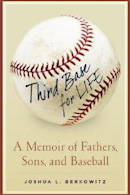 |
Third Base for Life: A Memoir of Fathers, Sons and Baseball By Joshua L. Berkowitz ’91 Vantage Press, $15.95 Why would a nice, risk-averse internist brave long odds to lead his son and a motley crew of other Newton, Mass., fourth-graders to the uber-competitive youth baseball tournament at Cooperstown Dreams Park? Not because he thinks he’ll be successful. But he is, in more ways than one, including in overcoming his lifelong dread of humiliation. Does the first all-Jewish team to play in the tournament win the trophy? Does it win even a single game? Berkowitz tells an entertaining sports story, but at its heart this is a warm, nuanced tale about the bonds that nourish parent and child, skipper and team. Put them in, coach. They’re ready to play. |
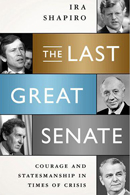 |
The Last Great Senate: Courage and Statesmanship in Times of Crisis By Ira Shapiro ’69 PublicAffairs, $34.99 In April, Gallup charted Americans’ approval of the U.S. Congress at a dismal 17 percent — the highest this rating had climbed since the previous July. To remember a time when the country had reason to applaud what its legislators were doing, Shapiro steps back to the 1960s and ’70s to chronicle the “last great” Senate, a body willing to throw off partisan ties to pass Civil Rights legislation and hold Nixon accountable for Watergate. An eyewitness to the work of formidable senators — Javits, Kennedy, Baker, Humphrey, Dirksen, Mansfield — Shapiro brings the negotiations and personalities of these titans to life. |
 |
In God’s Shadow: Politics in the Hebrew Bible By Michael Walzer ’56, H’81 Yale University Press, $28 A distinguished political theorist, Walzer delves deep into the Hebrew Bible to dissect the laws, prophecies and wisdom of its ancient writers and determine how they might answer such political questions as how power ought to be used, how authority is best defended and challenged, and what circumstances make war justifiable. Walzer reads the Bible as if he were reading Locke, Rousseau or Hegel, to understand its views on government and law. The result is a fascinating exploration. |
 |
A Tour of Reconstruction: Travel Letters of 1875 by Anna Dickinson Edited by J. Matthew Gallman, Ph.D.’86 University Press of Kentucky, $35 In the late 19th century, Anna Dickinson was one of the most famous women in America, an orator who made her name advocating tirelessly for the rights of women and blacks. In 1875, on a speaking tour of the South, she was able to see firsthand how far the region had come since the end of the Civil War. Her sharp observations, recorded in letters she wrote to her mother, capture the concerns, hopes and biases of the Southerners she met. Yet, as Gallman notes, Dickinson wasn’t entirely free from bias herself — her letters reveal an unsettling tendency to poke fun at the former slaves she had worked so hard to free. |
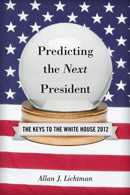 |
Predicting the Next President: The Keys to the White House 2012 By Allan J. Lichtman ’67 Rowman & Littlefield, $17.95 It’s more than “the economy, stupid.” Lichtman, a political analyst and historian, explains thirteen factors that determine American presidential elections. Four are political (for instance, is there a significant third-party candidate?). Seven are performance-based (e.g., has the incumbent administration been tainted by major scandal?). The final two look at personality (is either the incumbent or the challenger charismatic, or a war hero?). Just in time for the November elections, Lichtman’s analysis may help you predict the winner with ease. |
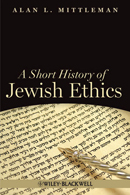 |
A Short History of Jewish Ethics By Alan L. Mittleman ’76 Wiley-Blackwell, $34.95 How should we behave? What kind of person should we strive to be? In an economical 200 pages, Mittleman, professor of Jewish thought at New York City’s Jewish Theological Seminary, thoroughly explores the chronology of Jewish moral thinking, tracing an interesting progression of ideas from the Bible to the work of leading contemporary ethicists. |
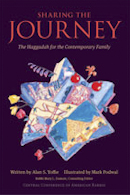 |
Sharing the Journey: The Haggadah for the Contemporary Family By Alan S. Yoffie ’67 Central Conference of American Rabbis, $39.95 The retelling of the Exodus from Egypt, the centerpiece of the Passover Seder, is best understood as a living, evolving narrative, Yoffie believes. With this beautifully designed and illustrated volume, he presents a new, inclusive Haggadah that recounts the ancient journey to freedom by “embracing traditions and clarifying the meaning of the symbols and rituals of Passover in language that is clear and approachable.” |
 |
Arc of Empire: America’s Wars in Asia from the Philippines to Vietnam By Michael H. Hunt and Steven I. Levine ’62 University of North Carolina Press, $35 They were not isolated efforts; they were a sustained quest for regional domination. So argue Hunt and Levine in their look at America’s four wars in Asia during the 20th century: conflicts with the Philippines (1899-1902), Japan (1941-45), Korea (1950-53) and Vietnam (1965-73). This pattern of engagement, the authors contend, offers profound lessons regarding current U.S. involvement in the Middle East and Central Asia. |
 |
Jewish Major Leaguers in Their Own Words By Peter Ephross, M.A.’93, with Martin Abramowitz McFarland & Company, $35 The roster goes well beyond Sandy Koufax: Between 1870 and 2010, no fewer than 165 Jewish Americans played Major League Baseball. Ephross’ volume collects the oral histories of 23 of them, including lesser-known players like Cal Abrams and Lou Limmer alongside such stars as Hank Greenberg and Al Rosen. Their personal reminiscences offer an engaging look at what it’s like to be a Jewish athlete in big-league ball. |
 |
Painting the Corners: A Collection of Off-Center Baseball Stories, Volume I By Bob Weintraub ’55 Iguana Books, $17.99 Longtime Fenway enthusiast Weintraub has penned a collection of short stories that revolve around baseball, told from a variety of perspectives — player, fan, broadcaster, owner, coach. In a clever twist, each story is prefaced by a sly real-life quotation, like this one from former Red Sox manager Jimy Williams: “In retrospect, you are always looking back.” |
 |
A Bench in London: The Story of an American Soldier By Carolyn Feigenbaum ’55 Self-published Feigenbaum wrote this illustrated children’s book in honor of her uncle, Selig Altschul (fictionalized here as “Zelig Oldeschool”), who loved sitting under the trees of Berkeley Square when he was a U.S. soldier in London during World War II. After his death, Zelig’s family memorializes his affection for London with a bench plaque, just as Selig’s loved ones did. A charming story about the importance of remembering the people and places that matter. |
Brandeis University Press
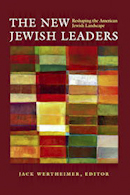 |
The New Jewish Leaders: Reshaping the American Jewish Landscape Edited by Jack Wertheimer Brandeis University Press, $39.95 “As we look ahead into the next century,” said Bill Gates fifteen years ago, “leaders will be those who empower others” — an assessment with which the authors of the essays included in this compilation would surely agree. The book takes the measure of today’s young Jewish leadership — defined here as those between the ages of 22 and 40 — from their attitudes and background, to their view of the Jewish agenda, to their reliance on the Internet in their activism and stewardship. |
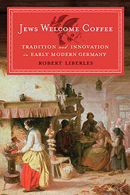 |
Jews Welcome Coffee: Tradition and Innovation in Early Modern Germany By Robert Liberles Brandeis University Press, $35 For a unique lens on early modern Jewish culture, look no farther than your neighborhood coffeehouse. Studying the consumption and commercialization of coffee in 18th-century Germany offers many surprising insights into Jewish life at the time, reports Liberles, who teaches European history at Ben Gurion University. What was then a new beverage serves as “an almost perfect symbol of the advent of new times,” he writes. Liberles’ lively, original take provides a bracing jolt of quotidian detail about how social change gets brewed. |
